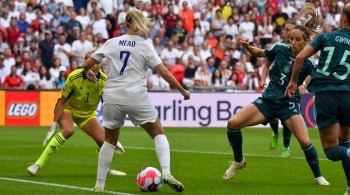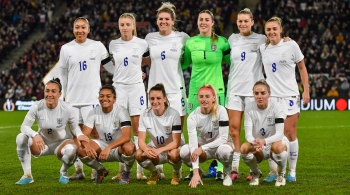Chief Executive Johnathan Thompson urges TV and broadcast industry to adapt to changing viewer habits in his speech delivered on February 6th at Everyone TV's Outside the Box 2024.

I love TV.
But perhaps like many of you – in the face of the limitless choice in front of me every evening – I can also be quick to judge, quick to conclude something’s not for me, and quick to skip on.
My TV watchlist is becoming a little like my book collection – impressive in breadth – but the majority is largely unread. But over the last month, it feels like something changed.
I’ve been reminded of that unique feeling when a TV programme truly captivates you. Leaves you breathlessly enthralled or furious with an injustice in the world.
When it prompts a spontaneous and uncontrollable belly laugh, or leaves you fighting back tears.
The phenomenon that is Traitors, and the brilliant storytelling of Mr Bates vs The Post Office, not only captured an audience, but also the national mood. And they did so at a time when watching TV had begun to feel like wandering aimlessly and anonymously around the largest shopping mall in the world.
This morning, I want to talk a little about the speed at which our industry is changing, but more about how we embrace that change, while still creating and cherishing these unique moments that TV can create.
Because we as an industry must do both for the sake of our audience.
Industry analysis
At the moment, our sofas feel like a relative place of safety, as the world continues to struggle with the aftermath of Covid, political uncertainty, and the wars in Ukraine and Gaza.
In a year when 4 billion people will have a chance to vote in national elections, some with more freedom of choice than others, this feels like a profoundly – even scarily – important moment for the world.
Of course, in this global context, considering the future of television might feel somewhat trivial. But, the correlation between the health of democracies around the world and the independence and impact of our media is not trivial.
The power of media to shine light where darkness pervades, and to bring us together on issues that have the potential to divide us, is of vital consequence.
So in this context, where do we find the global TV industry and the UK’s place within it?
Whilst I’m not a fan of describing any era as the “golden age of TV”, if we have been in one in recent years are we now past its peak?
Well, I think it would be more accurate to say our story is one of a gold rush – rather than a golden age.
You only need to look at those wily and debt-funded prospectors in the streaming world to know that.
Tougher policing of password sharing and their own entry into the advertising market show it all too clearly.
Netflix’s numbers remain impressive – but it’s clear there isn’t gold in them thar hills for everyone.
And as a consequence, the pipeline of content creation itself is now under greater pressure as the gold rush slows.
Great TV still matters.
Where does this leave the viewer in the face of this competitively challenging outlook?
Well as I began by saying, with no shortage of choice and diversity of content.
But with the cost-of-living crisis continuing to bite – whilst the transition from broadcast to streaming appears relentless – there is not a limitless pot of consumer gold to tap into when you get there.
It may have felt for the last five years like TV was on an endless expansionist foray to conquer new territory.
But it is now becoming increasingly clear that what we really have is more and more players all trying to co-exist on the same field of limited resources.
Reassuringly, the ability of a great TV drama or entertainment show to draw an audience to a big screen is as great as ever.
Social media may have turned many aspects of our lives upside down, but just as video didn’t kill the radio star, TikTok isn’t going to destroy TV – at least not unless people lose interest in the world, or in each other.
Great TV can always find an audience – but we can’t rely on the fact that it always will.
Now is the time for any player with an interest in the future of TV – streamer or content creator – industry player or policy maker – to face up to the need for a new approach.
The need for a new approach
Change is so fundamental now – so endemic to the industry that we work in – that we need to adopt a mindset of permanent reinvention.
We need to embrace the change required for the industry we want in the future, rather than merely preserving the system we have.
To disappoint you – I don’t claim to have the answers to the state of the world.
But let me try and paint some broad brushstrokes that – I believe – benefit the UK’s creative sector and its viewers.
Nobody owns the viewer.
First, we need to stop asking ourselves who will “own” the viewer of the future.
It’s an inherent arrogance to think that what I or you watch on TV can or should be owned by any one single entity. In fact, it’s dangerous even to entertain such ideas.
In an ever more crowded island of co-existence, it will be those who live the principles of partnership and collaboration who survive and thrive.
There may not be room for everyone. But there’s sufficient space for those who are incentivised to – and see the value of – working together.
TV is a global industry.
Second, whilst we should be very proud of the UK TV industry, and what it offers and represents, the forces that will shape the future of TV – streaming technology, global formats, AI – are not bound by the beaches of Britain.
TV is now a global industry shaped by global players and global trends. This is not to talk the UK down – quite the opposite in fact. We have so many strengths on the world stage – our language, our creativity, our unique blend of public intervention and market competition.
Our power and influence on the rest of the world is immense – but it is also at its most powerful if we play our part in shaping the global future…instead of trying to stand separate from it.
But we serve a UK audience.
The final theme is to be clear on what we want the outcomes of all this change to be for British viewers.
Because the industry we work in may be ever more global – but our prime responsibility remains to our home audience.
This is a delicate balance to achieve: protectionism brings with it the risk of marginalisation. But give up all interventions and we become a 51st state in Netflix’s global strategy.
So, in this global shopping mall of TV – what role for the British TV retailers?
Reith’s mantra was for broadcasters to inform, educate and entertain.
These pillars of public broadcasting endure today, but I believe that we now need to consider a fourth – that of connection.
Streaming may enable a one-to-one relationship – but fundamentally we are still a “broadcasting” industry.
TV’s real USP – more than any other media – is to reach a mass audience and to create a sense of shared experience for that audience.
Social media was hailed as the tech innovation that would connect us in the digital age – but at its worst, risks connecting us to the bits of each other we least like and trust.
It is TV that connects us to what we already have in common.
Nothing has illustrated these principles more clearly in the last few weeks than Mr Bates vs The Post Office.
This was a uniquely British story. Told in a uniquely British way. Commissioned with courage and conviction. Made with care and humanity.
Neither the most expensive nor the glossiest drama ever made, nor one that will likely appeal to a global audience. But it so vividly illustrated the role that TV should play in our society here in the UK – and that only it can play.
And not just any TV. Free TV. TV that is accessible to everyone, everywhere.
Freely is a part of the solution
This takes me to Everyone TV and the launch of Freely You can find more Freely here – so rather than explain what it is, let me explain why we’re launching it.
Freely is part of ensuring we continue to deliver our core mission of championing great TV for all.
It is designed to ensure that we continue the journey into the streaming age, and that all viewers continue to have the same simple access to the channels, services and programmes they love. And, that the nation can continue to come together for those huge TV moments.
It’s also built on the spirit of collaboration.
A new model of partnership between the PSBs in providing the best free TV experience whilst continuing to support their own VOD player strategies.
And partnering with global TV manufacturers and OS providers to deliver a compelling proposition for UK viewers that works with the grain of the global strategies of these players – not against them.
And yes, offering at its heart the best way of watching live TV in the streaming age.
Because despite all the shifts in viewing behaviour, live TV is what achieves that sense of connection.
It is the best shop window in the shopping mall of video-on-demand. And it is one of our broadcasters’ greatest points of difference from their competitors.
Freely will offer viewers simple and easy access to the best of TV – designed for and preparing for its future. Keeping the audience together rather than driving it apart. It’s a solution developed in and for the UK – but one that perhaps offers a model that could work in other markets.
When we launch Freely later this year – this isn’t the end of the journey for us – but the start of our next chapter.
We will continue to involve more partners, continue to evolve the service, and continue to find the best ways of delivering against those principles of providing simple access to the most engaging content.
Conclusion
I started this speech with a rather downbeat assessment of both the wider global context and the state of the TV market. But, I want to end on a more positive note.
I’ve had the opportunity to meet with a number of European broadcasters over the last few weeks – as we’ve shared some of our plans for the launch of Freely.
Despite wider political developments over the last few years, when it comes to TV, they look to the UK as the benchmark, perhaps even the gold standard.
The last month has vividly illustrated why. The future is both certain and uncertain. We know the rise of global market forces will continue to impact British broadcasting, we just don’t yet know the extent.
We know what makes British broadcasting brilliant. We know we can’t rest on our laurels – and expect to thrive, or even survive.
Now is the time to take risks. To be bold. To lead.
Now is the time to hold on to the best of the past but most importantly of all, reinvent ourselves for the future.
Freely is our contribution to that.



